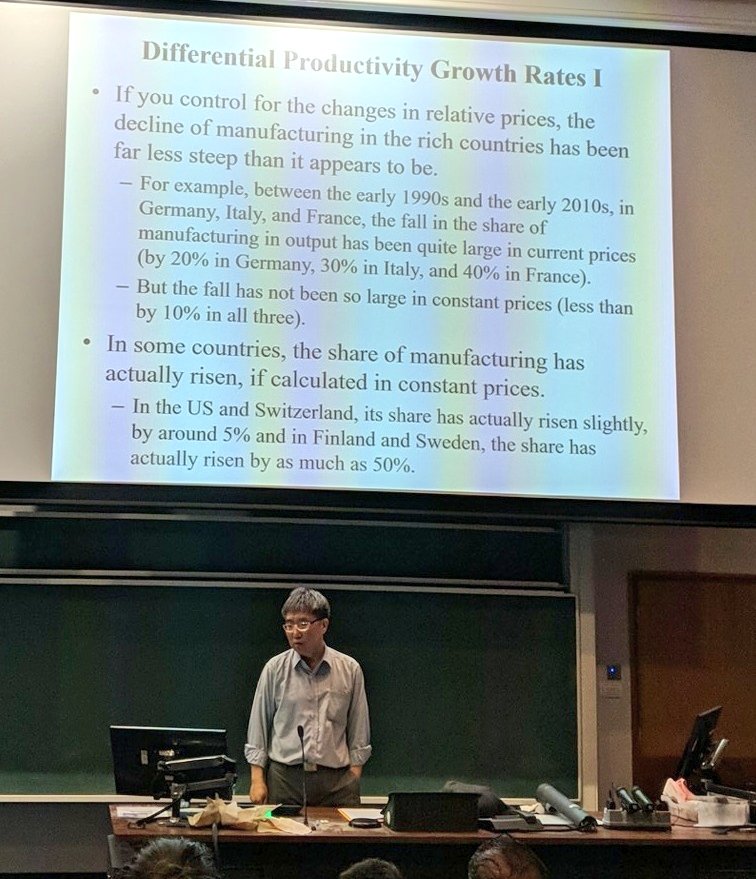Dani Rodrik has a nice interview to ProMarket, the blog of the Stigler Center at the University of Chicago Booth School of Business. Rodrik’s views are dissenting but within the conventional DC wisdom/New Consensus. For example, he said as recently as last year that free trade is fine as long as losers as compensated, which is far from accurate, as free trade leads to loser regions as well. Still he has better views than neoliberals. In this interview Rodrik is asked about the ant-globalisation backlash:
Q: Much of the anti-globalization backlash of the last two years has been xenophobic, racist, authoritarian in nature. What is it about the nature of globalization that led to this kind of response?
I think a lot of it has to do with the fact that the left has been missing in action. Twenty years ago, when I was fretting that globalization would create a backlash, I would have guessed that the main beneficiary of this might have been the left, because it would capitalize on the economic and social grievances that these divisions create. Indeed, when we think about the populisms of the late 19th century—in the US or for that matter Latin America, with its long history of populism—they were by and large not racist and xenophobic, ethno-nationalist populisms, but left-wing populisms that focused on financial elites, on corporate elites, and pushed for social reform and more regulation of the economy.
Today, here and in Europe, we’re seeing much more of a right-wing ethnonationalist backlash. I think it’s partly that the left has been missing in action and that the center-left and the social democrats have essentially been complicit in many of these changes since the 1990s. New Democrats in the US and New Labour in the UK were at the very forefront of this push for hyperglobalization, so they couldn’t easily disassociate themselves from this complicity. I think Hillary Clinton’s ill-fated campaign showed that very well.
There were other shocks that made it easier. For example, immigration made it easy for right-wing nativists to provide a much more nativist, ethnonationalist frame for economic and social grievances to which I think one might have responded very differently.
This is a fairly accurate description of what has happened. As I have mentioned many times, the absence of a strong political alternative gave enough opportunities for the far right to come to power. It had an appeal—which the left lacked—although no real solution.
Although we see a lot of left-wing activism these days, it is mainly restricted to cultural issues. People still hold right wing economic ideas while sounding faux left wing.
The 2017 Trade And Development Report by UNCTAD is a good place to start. It argues for a global new deal:
Austerity measures adopted in the wake of the global financial crisis nearly a decade ago have compounded this state of affairs. Such measures have hit the world’s poorest communities the hardest, leading to further polarization and heightening people’s anxieties about what the future might hold. Some political elites have been adamant that there is no alternative, which has proved fertile economic ground for xenophobic rhetoric, inward-looking policies and a beggar-thy-neighbour stance. Others have identified technology or trade as the culprits behind exclusionary hyperglobalization, but this too distracts from an obvious point: without significant, sustainable and coordinated efforts to revive global demand by increasing wages and government spending, the global economy will be condemned to continued sluggish growth, or worse.
The Trade and Development Report 2017 argues that now is the ideal time to crowd in private investment with the help of a concerted fiscal push – a global new deal – to get the growth engines revving again, and at the same time help rebalance economies and societies that, after three decades of hyperglobalization, are seriously out of kilter. However, in today’s world of mobile finance and liberalized economic policies, no country can do this on its own without risking capital flight, a currency collapse and the threat of a deflationary spiral. What is needed, therefore, is a globally coordinated strategy of expansion led by increased public expenditures, with all countries being offered the opportunity of benefiting from a simultaneous boost to their domestic and external markets.



